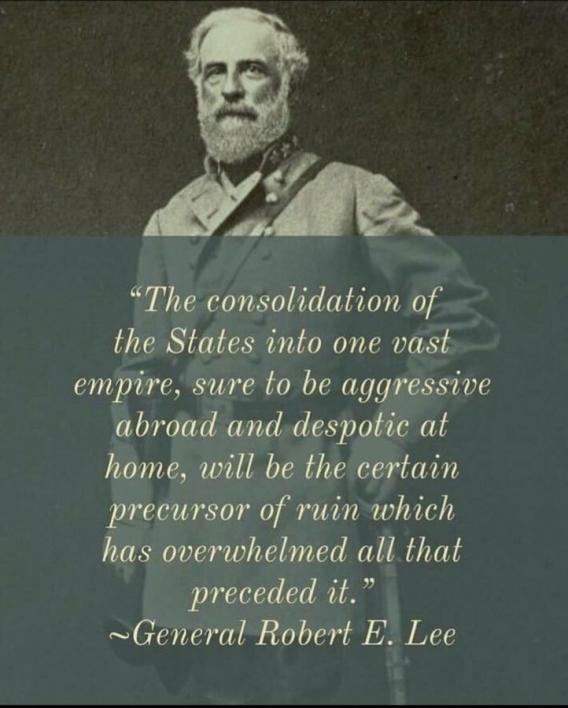 General Robert E. Lee had an incredibly accurate prediction of what the US empire would later turn out to be.
General Robert E. Lee had an incredibly accurate prediction of what the US empire would later turn out to be.Due to his reputation as one of the finest officers of his time, he would be the very first person Lincoln approached to lead the Unions army in April of 1861. Lee declined and tendered his resignation from the army when the state of Virginia seceded on April 17, arguing that he could not fight against his own people. He would say, “If Virginia stands by the old Union,” so will I. But if she secedes then I will follow my native State with my sword, and, if need be, with my life.”`
Lee accepted command of the Confederate Army of Northern Virginia on June 1, 1862 and was elevated to the rank of General in Chief of the Armies of the Confederate States on February 6, 1865.
In Appomattox, Virginia, on April 9, 1865, Robert E. Lee; the confederacy’s most respected commander, surrenders his 28,000 Confederate troops to Union General Ulysses S. Grant, effectively ending the American Civil War. As the Confederate army marches by Union General Joshua Chamberlain, the General had his man stand at attention and salute the recently vanquished confederates, he would later say of that moment,
"For us they were fellow-soldiers as well, suffering the fate of arms. We could not look into those brave, bronzed faces, and those battered flags we had met on so many fields where glorious manhood lent a glory to the earth that bore it, and think of personal hate and mean revenge."
As a part of the agreement All officers and men were to be pardoned, and they would be sent home with their private property–most important, the horses, which could be used for a late spring planting. Officers would keep their side arms, and Lee’s starving men would be given Union rations.
Lee returned home on parole and eventually became the president of Washington College in Virginia. He remained in this position until his death on October 12, 1870 in Lexington, Virginia. General Lee is universally regarded as one of the finest commanders in US history. For the vast majority of the time since the civil war, he was regarded as one of the finest Americans of all time. His portrait even hung in President Dwight D. Eisenhower’s Oval Office.
Its sad today that so many demagogues, politicians, and foe academics have such vitriol for the men who fought in the war. In many cases they hold more animosity for the South then the actual men who were at war with them did. The desecration of the Reconciliation Memorial in Arlington National cemetery was a disgrace, and will only serve to weaken that bond of fraternal reconciliation between the North and the South.
